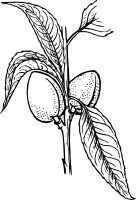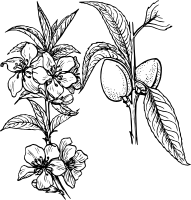Associations to the word «Almond»
Noun
- Raisin
- Cinnamon
- Vanilla
- Plum
- Peanut
- Paste
- Pastry
- Olive
- Peach
- Chocolate
- Pudding
- Lemon
- Dessert
- Nut
- Marc
- Chestnut
- Blossom
- Pear
- Ounce
- Sesame
- Butter
- Cream
- Appendage
- Cake
- Milk
- Cookie
- Syrup
- Cereal
- Bake
- Sugar
- Macarthur
- Soy
- Pint
- Melon
- Flour
- Kernel
- Grape
- Cherry
- Sunflower
- Quart
- Raspberry
- Garlic
- Flavour
- Soybean
- Barley
- Strawberry
- Peel
- Spice
- Dough
- Flavor
- Mulberry
- Cocoa
- Ingredient
- Biscuit
- Orchard
- Recipe
- Pineapple
- Sauce
- Honey
- Pea
- Juniper
- Mango
- Baking
- Candy
- Oat
- Cucumber
- Willoughby
- Boil
- Fruit
- Ginger
- Odour
- Clete
- Pumpkin
- Crunch
Adjective
Adverb
Pictures for the word «Almond»
Wiktionary
ALMOND, noun. (countable) A type of tree nut.
ALMOND, noun. (countable) A small deciduous tree in family Rosaceae, Prunus dulcis, that produces almonds.
ALMOND, noun. Other plants that produce almond-like nuts:
ALMOND, noun. Prunus japonica, flowering almond, an ornamental shrub in family Rosaceae
ALMOND, noun. Prunus andersonii, desert almond, a North American shrub in family Rosaceae
ALMOND, noun. Prunus fasciculata, desert range almond or wild almond, North American shrub in family Rosaceae
ALMOND, noun. Terminalia catappa, Indian almond or tropical almond, in family Combretaceae
ALMOND, noun. Brabejum stellatifolium, wild almond or bitter almond, in family Proteaceae
ALMOND, noun. (uncountable) The colour of the kernel of an almond without its shell and thin seed coat, a creamy off-white colour.
ALMOND, noun. (uncountable) The color of an almond still covered by its skin, a shade of brown.
ALMOND, noun. Anything shaped like an almond; specifically, (anatomy) (archaic) a tonsil.
ALMOND, adjective. Brownish, resembling the colour of an almond nut.
ALMOND, proper noun. A surname.
ALMOND FURNACE, noun. A kind of furnace used in refining, to separate the metal from cinders and other foreign matter.
ALMOND FURNACES, noun. Plural of almond furnace
ALMOND MILK, noun. A milky liquid made from almonds and used as a milk substitute, cooking ingredient or beverage.
ALMOND TREE, noun. The tree that bears the almond, Prunus dulcis.
ALMOND TREE, noun. The Indian almond, Terminalia catappa
ALMOND TREES, noun. Plural of almond tree
ALMOND WILLOW, noun. Salix triandra, a species of willow native to Europe and Western and Central Asia.
Dictionary definition
ALMOND, noun. Small bushy deciduous tree native to Asia and North Africa having pretty pink blossoms and highly prized edible nuts enclosed in a hard green hull; cultivated in southern Australia and California.
ALMOND, noun. Oval-shaped edible seed of the almond tree.
Wise words
Words are always getting conventionalized to some secondary
meaning. It is one of the works of poetry to take the
truants in custody and bring them back to their right
senses.



